【备考2023】英语高考语法专项复习 动词的时态 课件(61张PPT)
文档属性
| 名称 | 【备考2023】英语高考语法专项复习 动词的时态 课件(61张PPT) |  | |
| 格式 | zip | ||
| 文件大小 | 9.4MB | ||
| 资源类型 | 试卷 | ||
| 版本资源 | 人教版(2019) | ||
| 科目 | 英语 | ||
| 更新时间 | 2023-02-08 22:02:27 | ||
图片预览


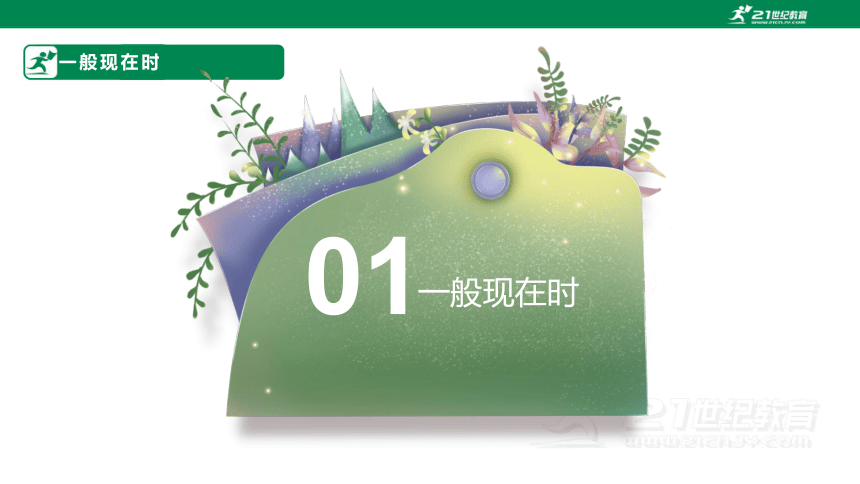
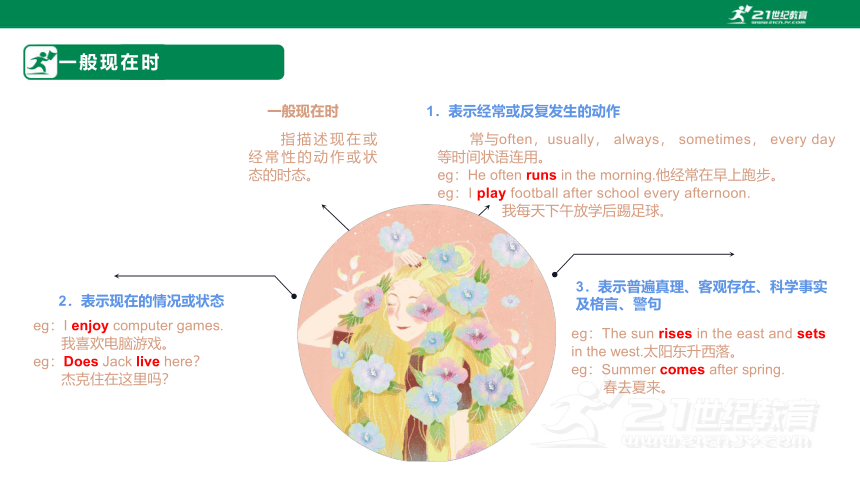
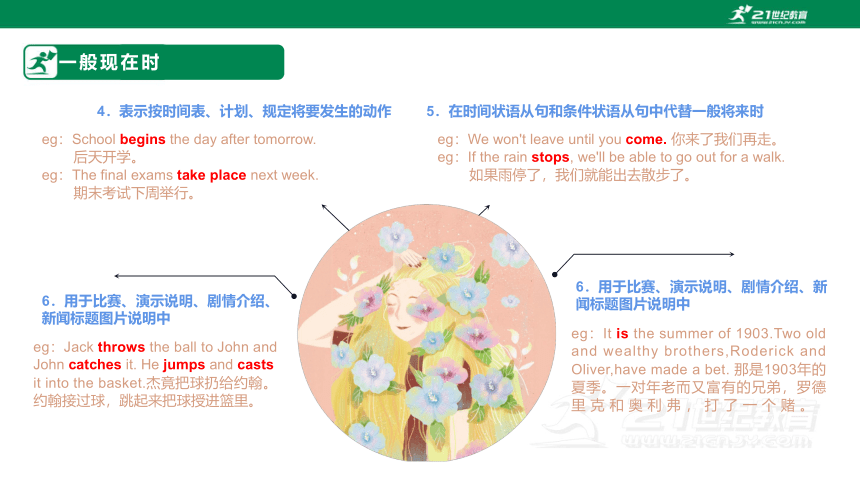


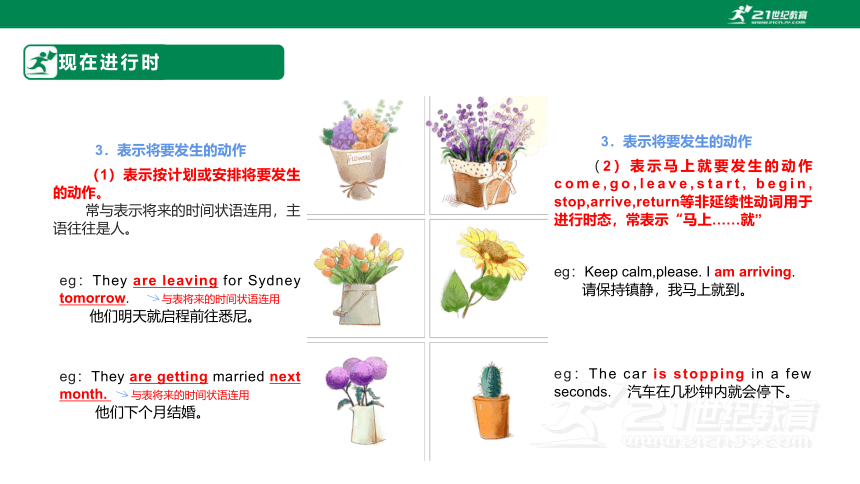



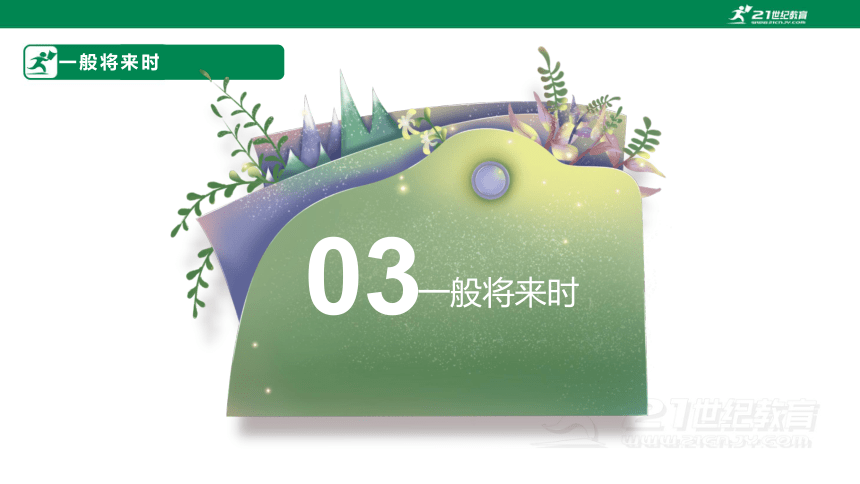
文档简介
(共61张PPT)
动词的时态
【备考2023】高考专项语法
目录
目 录
CONTENTS
1. 一般现在时
2. 现在进行时
3. 一般将来时
4. 一般过去时
5. 过去进行时
6. 现在完成时
7.现在完成进行时
8. 过去完成时
9. 过去完成进行时
10. 过去将来时
11. 将来进行时
12. 课后练习
一般现在时
01
一般现在时
一般现在时
eg:I enjoy computer games.
我喜欢电脑游戏。
eg:Does Jack live here?
杰克住在这里吗?
2.表示现在的情况或状态
指描述现在或经常性的动作或状态的时态。
一般现在时
常与often,usually, always, sometimes, every day 等时间状语连用。
eg:He often runs in the morning.他经常在早上跑步。
eg:I play football after school every afternoon. 我每天下午放学后踢足球。
1.表示经常或反复发生的动作
eg:The sun rises in the east and sets in the west.太阳东升西落。
eg:Summer comes after spring.
春去夏来。
3.表示普遍真理、客观存在、科学事实及格言、警句
一般现在时
eg:Jack throws the ball to John and John catches it. He jumps and casts it into the basket.杰竟把球扔给约翰。约翰接过球,跳起来把球授进篮里。
6.用于比赛、演示说明、剧情介绍、新闻标题图片说明中
eg:School begins the day after tomorrow.
后天开学。
eg:The final exams take place next week.
期末考试下周举行。
4.表示按时间表、计划、规定将要发生的动作
eg:We won't leave until you come. 你来了我们再走。
eg:If the rain stops, we'll be able to go out for a walk.
如果雨停了,我们就能出去散步了。
5.在时间状语从句和条件状语从句中代替一般将来时
eg:It is the summer of 1903.Two old and wealthy brothers,Roderick and Oliver,have made a bet. 那是1903年的夏季。一对年老而又富有的兄弟,罗德里克和奥利弗,打了一个赌。
6.用于比赛、演示说明、剧情介绍、新闻标题图片说明中
现在进行时
02
现在进行时
现在进行时
这种用法表示目前一段时间内在做某一件事,但说话时未必正在做。
2.表示现阶段正在进行的动作
eg:We are making model planes these days.
这些天我们在做飞机模型。
eg:Susan is writing a book about herself.
苏珊在写一部关于她自己的书。
这种用法往往表示动作已经开始,说话时没完成,仍在继续进行。常与now,right now,at this moment,at present等时间状语连用。
1.表示说话时正在进行的动作或状态
eg:We are having our English class now. 我们现在在上英语课。
eg:It's snowing hard outside.
外面的雪下得正大。
现在进行时
(2)表示马上就要发生的动作come,go,leave,start, begin, stop,arrive,return等非延续性动词用于进行时态,常表示“马上……就”
3.表示将要发生的动作
eg:Keep calm,please. I am arriving.
请保持镇静,我马上就到。
eg:The car is stopping in a few seconds. 汽车在几秒钟内就会停下。
(1)表示按计划或安排将要发生的动作。
常与表示将来的时间状语连用,主语往往是人。
3.表示将要发生的动作
eg:They are leaving for Sydney tomorrow. 与表将来的时间状语连用
他们明天就启程前往悉尼。
eg:They are getting married next month. 与表将来的时间状语连用
他们下个月结婚。
现在进行时
系表结构一般不用进行时态,但有时表示性质、品质等的形容词如 foolish,nice,kind,careful, patient, lazy, silly, rude,polite,impolite, pleasant,energetic,lovely,lively等作表语时, 可以用进行时,表示一时的表现。
5.某些系表结构的进行时表示一时的表现
eg:You're being annoying.
你有点惹人烦。 平时不这样
eg:Why are you being so foolish
你为什么表现得这么笨? 平时并不笨
现在进行时与always,constantly, continually,forever等频度副词连用时,表达生气、赞扬、厌烦、不满、惊讶等感彩。
4.表示特定的情感
eg:She is always complaining about her work. 表示厌烦
她总是在抱怨她的工作。
eg:Maria is always thinking of others instead of herself. 表示赞美
玛丽亚总为别人着想,而不是为自己着想。
现在进行时
(2)表示属性或拥有的动词不能用进行时态
6.不能用进行时的动词
常见的此类动词有have(有),own,possess,belong to,have on,consist of等。
eg:This dictionary belongs to Peter.
这本词典是彼得的。
(1)表示心理活动的动词一般不用进行时态
6.不能用进行时的动词
常见的此类动词有love,like,hate,know,under-stand,realize,remember,believe,want,hope, wish,need,agree等。
eg:She understands you better now. 她现在更理解你了。
现在进行时
(4)表示行为结果的动词一般不用进行时态
6.不能用进行时的动词
常见的此类动词有 accept,admit,receive,allow, decide,promise等。
eg:I accept your advice.
我接受你的建议。
(3)表示表象、感官的系动词不能用进行时态
6.不能用进行时的动词
常见的此类动词有seem,appear,look,sound, taste等。
eg:The music sounds beautiful.
这音乐听起来很美。
一般将来时
03
一般将来时
一般将来时
03
一般将来时
一般将来时用来表示将来某个时间要发生的动作或存在的状态,或表示将来经常反复发生的动作,通常可有几种形式表示。
表示将要发生的动作或存在的状态,或表示一种倾向或推测,也表示临时做出的打算。shall一般用于第一人称,will可用于各种人称。
1.will/shall do 结构表示将来
eg:Next month we will have our school open day.
下个月我们将迎来学校开放日。
eg:Will you be free this evening?今晚你有空吗?
一般将来时
03
一般将来时
一般将来时用来表示将来某个时间要发生的动作或存在的状态,或表示将来经常反复发生的动作,通常可有几种形式表示。
will常伴有说话者的主观意识,往往指没有经过计划而临时出现的意图。
【拓展】
eg:I'll answer the door. 我去开门。
一般将来时
03
一般将来时
一般将来时用来表示将来某个时间要发生的动作或存在的状态,或表示将来经常反复发生的动作,通常可有几种形式表示。
表示说话者主观打算做某事,或客观迹象表明即将发生某事。
2.be going to do 结构表示将来
eg:I feelII am going to make progress with her. 我觉得在她的帮助下我会进步的。
eg:It's going to rain soon. 很快就要下雨了。
一般将来时
03
一般将来时
一般将来时用来表示将来某个时间要发生的动作或存在的状态,或表示将来经常反复发生的动作,通常可有几种形式表示。
表示计划中约定的或按职责、义务和要求必须去做的事或即将发生的动作。
3.be to do 结构表示将来
eg:Your assignment is to be handed in next Monday. 要求必须做的事
你的作业下周一必须上交。
eg:The president is to visit China next week. 总理下周将访问中国。 表示计划
一般将来时
03
一般将来时
一般将来时用来表示将来某个时间要发生的动作或存在的状态,或表示将来经常反复发生的动作,通常可有几种形式表示。
表示马上就要发生的事,不强调主观。一般不与时间状语连用。
4.be about to do 结构表示将来
eg:The game is about to start.
比赛马上开始。 客观要发生的事
eg:Hurry up! The train is about to leave.
快点!火车就要开了。 客观要发生的事
一般将来时
03
一般将来时
一般将来时用来表示将来某个时间要发生的动作或存在的状态,或表示将来经常反复发生的动作,通常可有几种形式表示。
next time 下次 before long 不久后
later(on)以后 this afternoon今天下午
tomorrow 明天 in the future 在将来
the day after tomorrow 后天 next year 明年
【拓展】常与一般将来时连用的时间状语
eg:The game is about to start.
比赛马上开始。 客观要发生的事
eg:Hurry up! The train is about to leave.
快点!火车就要开了。 客观要发生的事
一般将来时
03
一般将来时
一般将来时用来表示将来某个时间要发生的动作或存在的状态,或表示将来经常反复发生的动作,通常可有几种形式表示。
现在进行时表示将来,往往是指计划好或准备要做的事。一些表示动作转换的非延续性动词,如go,come,leave,start,begin等的进行时则表示马上要做某事。
5.现在进行时表示将来
eg:He is leaving school in one year's time.
他一年后就要毕业了。
一般将来时
03
一般将来时
一般将来时用来表示将来某个时间要发生的动作或存在的状态,或表示将来经常反复发生的动作,通常可有几种形式表示。
(1)按照计划或时刻表要发生的事情
6.一般现在时表示将来
eg:The new library opens next month.
新图书馆下月开放。
eg:We have no classes tomorrow. 明天我们不上课。
一般将来时
03
一般将来时
一般将来时用来表示将来某个时间要发生的动作或存在的状态,或表示将来经常反复发生的动作,通常可有几种形式表示。
(2)在条件状语从句和时间状语从句中用一般现在时表示将来
6.一般现在时表示将来
eg:When she comes, I'll tell her about it.
她来时我将把这件事告诉她。
eg:If you leave tomorrow, I'll see you off at the airport. 如果你明天走,我会到机场送你。。
一般过去时
04
一般过去时
一般过去时
04
一般过去时
1.表示过去发生的动作或存在的状态
eg:The fire broke out during the night. 大火发生在夜间。
eg:The three of us traveled around Europe for about a month last summer. 去年夏天,我们三个人在欧洲旅行了大约一个月。
2.表示过去经常性或习惯性的动作
这时常与always, usually, often,sometimes,never 等时间状语连用。
eg:Sometimes I just relaxed under a tree or sat on the grass. 与时间状语 sometimes 连用
有时,我只是在树下或坐在草地上休息。
eg:When I was in primary school, my teacher often praised me. 我上小学时,老师常常表扬我。
一般过去时
04
一般过去时
3.表示过去将来的动作
一般用在时间状语从句和条件状语从句中。
eg:They said they would let us know if they heard any news about him. 用一般过去时表示过去将来的动作
他们说如果听到什么关于他的消息,就通知我们。
eg:He told me he would wait until my parents came back.
用一般过去时表示过去将来的动作
他告诉我他要等到我父母回来。
【拓展】常与一般过去时连用的时间状语
yesterday 昨天;last night昨天晚上
in 2012在2012年
at that moment 在那时
a few days ago几天前;then 那时
just now 刚才; last year 去年
at the time 当时
the other day 前几天
in the past在过去
the day before yesterday 前天
过去进行时
05
过去进行时
过去进行时
05
1.表示过去某一时间正在进行的动作
此时句中往往有表示过去的时间状语then,atthat moment, at that time, at the time, this time yesterday等。没有时间状语时,需要根据上下文的语境体会。
eg:They were having a class at this time yesterday. 昨天这时他们在上课。
eg:He was sleeping from 8 to 10 last night. 他昨天晚上8点到10点在睡觉。
2.表示过去将要发生的动作
表示从过去某一时间看将要发生的动作,常表示“渐渐”“快要”等。常与短暂性动词come,go,start,begin,leave,arrive,get,become,turn等连用。
eg:He said the plane was arriving soon. 表示将抵达
他说飞机快要到了。
eg:I was told Susan was leaving for New York next week. 表示将要去
有人告诉我,苏珊下周要去纽约。
过去进行时
05
3.表示礼貌
有时过去进行时并不表示过去的时间,而是表达现在的客气、礼貌或不确定等感彩。此类动词主要有 hope,wonder,think,expect等。
eg:I was wondering if we could have dinner together. 不知我们能否一起吃饭。
eg:I was thinking if you could finish your work this week.我在想你这周能否完成工作。
4.表示特定的情感
与现在进行时相似,过去进行时也可与always,forever,constantly等时间状语连用,表示厌烦、惊讶、赞扬等特殊情感。
eg:She was always ringing me up when I was in London. 表厌烦
我在伦敦时她总不停地给我打电话。
eg:Jim was always thinking of others. 表赞扬
吉姆总是时刻替别人着想。
过去进行时
05
【拓展】
过去进行时往往表示未完成,而一般过去时往往表示完成。
eg:She was studying in Canada last year. I don't know if she has returned.
她去年在加拿大学习,不知她是否回来了。
【拓展】
过去进行时往往表示未完成,而一般过去时往往表示完成。
eg:She studied in Canada last year.
去年她在加拿大学习过。
现在完成时
06
现在完成时
现在完成时
06
现在完成时
1.强调过去的动作对现在的影响
这种用法表示说话时已经完成的动作,但这个动作的结果对现在仍有影响。常与already,yet,now,just等时间状语连用。
eg:My wife has just bought a beautiful dress from one of the shops there.
我的妻子刚从那儿的一家商店买了一件漂亮的衣服。
eg:I have lost my pen; I am unable to do my homework.
我的笔丢了,我没法做作业了。
现在完成时
06
现在完成时
2.表示过去的某一动作或行为一直持续到现在
这种用法表示动作发生在过去,但一直持续到 现在,并且有可能继续持续下去。常与表示一段 时间的状语连用,如 all my life, all the time,all day, up to now, so far, in the past/last few years, (ever) since then, ( ever) since last year, since two years ago,(ever) since,for a long time 等。
eg:I have studied English for two years. 表示一种持续的动作
我已经学了两年英语。
eg:I have lived here since I was born.
我自出生就住在这里。
现在完成时
06
现在完成时
3.表示自过去某一时刻到说话时这段时间中的经历
现在完成时的这一用法常用ever,never以及表示次数的词或短语作时间状语。
eg:We have visited your factory before.
我们以前参观过你们的工厂。
eg:Have you ever been abroad
你曾经到过国外吗?
现在完成时
06
现在完成时
【拓展】have gone to 与have been to 的区别
have goneto表示“到某地去了”,句子主语的主人不在现场,通常是第三人称作句子的主语。havebeen to表示“去过某地”,现在已经不在那里了,常与ever,just等词连用。
eg:Mary has gone to the library. 玛丽去图书馆了。
现在还没回来
eg:Mary has been to Hong Kong twice. 玛丽去过香港两次。
现在已经回来
现在完成时
06
现在完成时
4.在时间、条件等状语从句中,代替将来完成时
eg:I'll watch TV as soon as I've finished my homework.
我一做完作业就看电视。
eg:If you have seen that movie, you will know this actor.
如果你看过那部电影,你就会认识这位演员。
现在完成时
06
现在完成时
5.现在完成时与一般过去时的用法区别
这两个时态都谈论过去已发生的事,但现在完成时表示的动作与现在有关系,或是对现在有影响,或谈现在以前的一段时间里发生的事;而一般过去时单纯谈过去的事,与现在没有联系。
eg:He has been in the army for 5 years. 他在部队5年了。
还在部队
eg:He was in the army for 5 years. 他在部队待过5年。
现已离开部队
eg:I haven't seen him this afternoon. 我今天下午没见过他。
现仍是下午
eg:I didn't see him this afternoon. 我今天下午没见过他。
现是晚上,已不是下午
现在完成进行时
07
现在完成进行时
现在完成进行时
07
现在完成进行时
1.表示一个持续
到现在的动作
现在完成进行时表示动作从过去某一时间开始直延续到现在,并且有可能持续下去。该时态多用延续性动词,如live,learm,lie,stay,sit,wait, stand,rest,study等,并常和 all this time,this week, this month, all might, all the morning,recently等状语以及since...和for...时间状语连用(与since和for连用时,动作常会继续下去)。
eg:How long have you been living here 你住在这儿多久了?
eg:The boys have been watching TV since seven o'clock. 动作仍在继续
自七点开始,男孩子们就一直在看电视
现在完成进行时
07
现在完成进行时
2.表示动作重复
有时现在完成进行时所表示的动作并不是一直在不停地进行,而是在断断续续地重复。
eg:We have been seeing a lot of each other recently.
最近我们常常见面。
eg:You've been losing things all the time. 你一直在丢东西。
现在完成进行时
07
现在完成进行时
3.表示长时间
做某事
在强调长时间做某事时用现在完成进行时。
eg:I feel a little tired because I have been playing basketball.
我有些累,我刚才一直在打篮球
eg:We have been waiting for you for an hour.
我们已经等你一个小时了。
现在完成进行时
07
现在完成进行时
4.表示某种
感彩
现在完成进行时有时带有强烈的表扬或厌恶等感彩。
eg:You know, you really have been making things terribly difficult for him.
你要知道,你真的是太为难他啦
eg:The lazy boy has been lying in bed for a whole day.
这个懒孩子在床上躺了一天了。
现在完成进行时
07
现在完成进行时
【拓展】
现在完成时强调动作的完成,现在完成进行时强调动作的延续。
eg:I have watered the flowers this morning. 动作已经完成
今天早晨我已经浇过花了。
eg:I have been watering the flowers this morning. 动作一直在持续
今天早晨我一直在浇花。
过去完成时
08
过去完成时
过去完成时
eg:Mr.Wang had taught in the south for five years before he came here.王老师来这里前已经在南方任教五年了。
2.表示从过去某一时间开始一直延续到过去另一时间的动作或状态
这种用法表示“过去的过去”。常用by,before等介词短语或时间状语从句来表示过去的时刻,也可以用一个表示过去的动作或上下文来表示。
1.表示过去某一时间或动作之前已完成的动作
eg:The film had been on for five minutes when I got to the cinema. 发生在“我到电影院”之前
我到电影院时电影已经开映五分钟了。
eg:She found that she had left her luggage on the bus. 发生在“她发现”之前
她发现自己的行李落在了公共汽车上。
1.表示过去某一时间或动作之前已完成的动作
eg:How long had he been away when you arrived
你来到时他已经走了多长时间了?
2.表示从过去某一时间开始一直延续到过去另一时间的动作或状态
过去完成时
在表示“就···..”的hardly/scarcely..when...,no sooner...than...句式中,含hardly/scarcely,no sooner 的分句常用过去完成时,且当hardly,scarcely,no sooner 置于句首时,句子要用部分倒装。
4.固定句式中的过去完成时
动词 hope, wish, plan, want,mean,intend, attempt, thought, expect等表示“打算、计划、希望、试图、认为”等的动词用于过去完成时表示过去未曾实现的愿望、打算或意图。
3.用来表示未曾实现的愿望或打算
eg:I had expected to receive his gift.我本希望能收到他的礼物的。 事实上“没收到礼物”
eg:They had hoped to be able to arrive before ten. 他们原本希望能在10点之前到达。 事实上“没在10点前到达”
3.用来表示未曾实现的愿望或打算
eg:Scarcely had I finished the exercise when the bell rang. 我一做完这个练习,铃就响了。
eg:We had no sooner arrived than we asked him about the matter.
我们一到那儿,就问他那件事情。
4.固定句式中的过去完成时
过去完成时
07
现在完成进行时
【拓展】
【拓展】常与过去完成时连用的时间状语
by the end oflast week到上周末为止
by that time 到那时为止
before that year 那年之前
long before很久以前
before I arrived在我到达之前
when I arrived在我到达时
过去完成进行时
09
过去完成进行时
过去完成进行时
【拓展】
过去完成时强调动作完成,而过去完成进行时强调动作的持续进行。
eg:I had already cleaned the kitchen. 强调动作完成
我已经打扫完厨房了。
eg:I had been cleaning the kitchen. 强调动作持续进行
我一直在打扫厨
过去完成进行时指从“过去的过去”某一个时间点开始的动作或状态,一直延续到过去,动作或状态是否继续,需根据上下文而定。
eg:He had been working in a factory before he came to Beijing.
他来北京之前一直在工厂上班。
eg:She had been living here before she went to Shanghai.
她去上海之前一直住在这里。
过去将来时
10
过去将来时
过去将来时
03
一般将来时
表示从过去某一时间来看将要发生的动作或存在的状态。常用于主句是一般过去时的宾语从句中,表示从句的动作发生在主句动作之后。过去将来时同一般将来时类似,除了用would do表示外,也可以用was/were going to do, was/were to do,was/were about to do 及过去进行时等方式表示。
eg:He said there would be a concert that evening.
他说晚上将有一场音乐会。
eg:She said she was going to prepare for her trip. 她说她将为她的旅行做准备。
【拓展】过去将来时句子中常用的时间状语
a week later-周后
the following day 第二天
the next month 下个月
after two weeks 两周后
将来进行时
11
将来进行时
将来进行时
04
一般过去时
1.现在将来进行时
指从现在算起的将来某一时间正在进行的动作或按计划、安排将要进行的动作。
eg:I won't be free Friday morning, I will be seeing a friend off.
表示按计划进行的某事 星期五早上我没空,我要给一位朋友送行
eg:If we don't do so, we shall be repeating the errors of the past.我们如果不这样做,就会重犯过去的错误。
2.过去将来进行时
表示就过去某一时间内而言,将来正在进行的动作,主要用于宾语从句中。
eg:He asked me what I would be doing at six the next day. 他问我第二天6点将正在做什么。
eg:Mary said that she would be waiting for me outside.
玛丽说她会在外面等我。
Practice
12
practice
语法填空
06
现在完成时
1. Silk _____ (become) one of the primary goods traded along the Silk Road by about 100 BC.
2. In the last few years,China _____ (make) great achievements in environmental protection.
3. -Did you have difficulty finding Ann's house
-Not really. She _____ (give) us clear directions and we were able to find it easily.
语法填空
06
现在完成时
4. -Dr. Jackson is not in his office at the moment.
-All right. I _____ (call) him later.
5. Jack _____ (work) in the lab when the power cut occurred.
6. -Excuse me, which movieare you waiting for
-The new Star Wars. We _____ (wait) here for more than two hours.
语法填空
06
现在完成时
7. I _____ (read) half of the English novel, and I'll try to finish it at the weekend.
8. Dashan,who _____ (learn) crosstalk, the Chinese comedic tradition, for decades, wants to mix it up with the Western stand-up tradition.
9. The real reason why prices _____ ( be ) , and still are, too high is complex, and no short discussion can satisfactorily explain this problem.
语法填空
06
现在完成时
10. Just as I got to the school gate,I realized I _____ (leave) my book in the cafe.
11. -Where is Peter? I can't find him anywhere.
-He went to the library after breakfast and _____ (write) his essay there ever since.
12. I found the lecture hard to follow because it _____ (start) when I arrived.
语法填空【答案解析】
06
现在完成时
1. had become 【解析】根据句中的时间状语 by about 100BC可知“become”动作发生在“过去的过去”,故用过去完成时。
2.has made 【解析】根据时间状语 In the last few years 可知用现在完成时。
3.had given 【解析】动词give表示的动作发生在“were ableto find”之前,表示“过去的过去”,故用过去完成时。
语法填空【答案解析】
06
现在完成时
4.will call 【解析】本句表示“临时决定”,故用“will+动词原形”。
5.was working 【解析】本题考查“be doing sth.when...”句型。根据题干中的 occurred(一般过去时),可知设空处用过去进行时。
6. have been waiting 【解析】本题考查动词的时态。设空处表示该动作从两个多小时前一直持续到说话时,而且可能持续下去,因此用现在完成进行时。
语法填空【答案解析】
06
现在完成时
7.have read 【解析】根据句意可知,动作read发生在过去,对现在产生了影响,故用现在完成时。
8.has been learning 【解析】根据句意以及 for decades 可知,学习这一动作从过去一直延续到了现在,并且现在还在进行,故用现在完成进行时;主语Dashan为第三人称单数,故答案为 has been learning。
9.were 【解析】根据题目中“and still are(现在仍然是)”可知过去也是一样的情形,故用were。
语法填空【答案解析】
06
现在完成时
10.had left 【解析】根据语境可知leave的动作发生在realized之前,所以用过去完成时态。
11.has been writing 【解析】根据时间状语 ever since 可知设空处表示动作从过去开始一直持续到现在且还 在进行,故用现在完成进行时。
12.had started 【解析】题干中的语境为过去时,根据句意可知空格处发生的动作先于arrived,故使用过去完成时。
谢谢
21世纪教育网(www.21cnjy.com)
中小学教育资源网站
兼职招聘:
https://www.21cnjy.com/recruitment/home/admin
动词的时态
【备考2023】高考专项语法
目录
目 录
CONTENTS
1. 一般现在时
2. 现在进行时
3. 一般将来时
4. 一般过去时
5. 过去进行时
6. 现在完成时
7.现在完成进行时
8. 过去完成时
9. 过去完成进行时
10. 过去将来时
11. 将来进行时
12. 课后练习
一般现在时
01
一般现在时
一般现在时
eg:I enjoy computer games.
我喜欢电脑游戏。
eg:Does Jack live here?
杰克住在这里吗?
2.表示现在的情况或状态
指描述现在或经常性的动作或状态的时态。
一般现在时
常与often,usually, always, sometimes, every day 等时间状语连用。
eg:He often runs in the morning.他经常在早上跑步。
eg:I play football after school every afternoon. 我每天下午放学后踢足球。
1.表示经常或反复发生的动作
eg:The sun rises in the east and sets in the west.太阳东升西落。
eg:Summer comes after spring.
春去夏来。
3.表示普遍真理、客观存在、科学事实及格言、警句
一般现在时
eg:Jack throws the ball to John and John catches it. He jumps and casts it into the basket.杰竟把球扔给约翰。约翰接过球,跳起来把球授进篮里。
6.用于比赛、演示说明、剧情介绍、新闻标题图片说明中
eg:School begins the day after tomorrow.
后天开学。
eg:The final exams take place next week.
期末考试下周举行。
4.表示按时间表、计划、规定将要发生的动作
eg:We won't leave until you come. 你来了我们再走。
eg:If the rain stops, we'll be able to go out for a walk.
如果雨停了,我们就能出去散步了。
5.在时间状语从句和条件状语从句中代替一般将来时
eg:It is the summer of 1903.Two old and wealthy brothers,Roderick and Oliver,have made a bet. 那是1903年的夏季。一对年老而又富有的兄弟,罗德里克和奥利弗,打了一个赌。
6.用于比赛、演示说明、剧情介绍、新闻标题图片说明中
现在进行时
02
现在进行时
现在进行时
这种用法表示目前一段时间内在做某一件事,但说话时未必正在做。
2.表示现阶段正在进行的动作
eg:We are making model planes these days.
这些天我们在做飞机模型。
eg:Susan is writing a book about herself.
苏珊在写一部关于她自己的书。
这种用法往往表示动作已经开始,说话时没完成,仍在继续进行。常与now,right now,at this moment,at present等时间状语连用。
1.表示说话时正在进行的动作或状态
eg:We are having our English class now. 我们现在在上英语课。
eg:It's snowing hard outside.
外面的雪下得正大。
现在进行时
(2)表示马上就要发生的动作come,go,leave,start, begin, stop,arrive,return等非延续性动词用于进行时态,常表示“马上……就”
3.表示将要发生的动作
eg:Keep calm,please. I am arriving.
请保持镇静,我马上就到。
eg:The car is stopping in a few seconds. 汽车在几秒钟内就会停下。
(1)表示按计划或安排将要发生的动作。
常与表示将来的时间状语连用,主语往往是人。
3.表示将要发生的动作
eg:They are leaving for Sydney tomorrow. 与表将来的时间状语连用
他们明天就启程前往悉尼。
eg:They are getting married next month. 与表将来的时间状语连用
他们下个月结婚。
现在进行时
系表结构一般不用进行时态,但有时表示性质、品质等的形容词如 foolish,nice,kind,careful, patient, lazy, silly, rude,polite,impolite, pleasant,energetic,lovely,lively等作表语时, 可以用进行时,表示一时的表现。
5.某些系表结构的进行时表示一时的表现
eg:You're being annoying.
你有点惹人烦。 平时不这样
eg:Why are you being so foolish
你为什么表现得这么笨? 平时并不笨
现在进行时与always,constantly, continually,forever等频度副词连用时,表达生气、赞扬、厌烦、不满、惊讶等感彩。
4.表示特定的情感
eg:She is always complaining about her work. 表示厌烦
她总是在抱怨她的工作。
eg:Maria is always thinking of others instead of herself. 表示赞美
玛丽亚总为别人着想,而不是为自己着想。
现在进行时
(2)表示属性或拥有的动词不能用进行时态
6.不能用进行时的动词
常见的此类动词有have(有),own,possess,belong to,have on,consist of等。
eg:This dictionary belongs to Peter.
这本词典是彼得的。
(1)表示心理活动的动词一般不用进行时态
6.不能用进行时的动词
常见的此类动词有love,like,hate,know,under-stand,realize,remember,believe,want,hope, wish,need,agree等。
eg:She understands you better now. 她现在更理解你了。
现在进行时
(4)表示行为结果的动词一般不用进行时态
6.不能用进行时的动词
常见的此类动词有 accept,admit,receive,allow, decide,promise等。
eg:I accept your advice.
我接受你的建议。
(3)表示表象、感官的系动词不能用进行时态
6.不能用进行时的动词
常见的此类动词有seem,appear,look,sound, taste等。
eg:The music sounds beautiful.
这音乐听起来很美。
一般将来时
03
一般将来时
一般将来时
03
一般将来时
一般将来时用来表示将来某个时间要发生的动作或存在的状态,或表示将来经常反复发生的动作,通常可有几种形式表示。
表示将要发生的动作或存在的状态,或表示一种倾向或推测,也表示临时做出的打算。shall一般用于第一人称,will可用于各种人称。
1.will/shall do 结构表示将来
eg:Next month we will have our school open day.
下个月我们将迎来学校开放日。
eg:Will you be free this evening?今晚你有空吗?
一般将来时
03
一般将来时
一般将来时用来表示将来某个时间要发生的动作或存在的状态,或表示将来经常反复发生的动作,通常可有几种形式表示。
will常伴有说话者的主观意识,往往指没有经过计划而临时出现的意图。
【拓展】
eg:I'll answer the door. 我去开门。
一般将来时
03
一般将来时
一般将来时用来表示将来某个时间要发生的动作或存在的状态,或表示将来经常反复发生的动作,通常可有几种形式表示。
表示说话者主观打算做某事,或客观迹象表明即将发生某事。
2.be going to do 结构表示将来
eg:I feelII am going to make progress with her. 我觉得在她的帮助下我会进步的。
eg:It's going to rain soon. 很快就要下雨了。
一般将来时
03
一般将来时
一般将来时用来表示将来某个时间要发生的动作或存在的状态,或表示将来经常反复发生的动作,通常可有几种形式表示。
表示计划中约定的或按职责、义务和要求必须去做的事或即将发生的动作。
3.be to do 结构表示将来
eg:Your assignment is to be handed in next Monday. 要求必须做的事
你的作业下周一必须上交。
eg:The president is to visit China next week. 总理下周将访问中国。 表示计划
一般将来时
03
一般将来时
一般将来时用来表示将来某个时间要发生的动作或存在的状态,或表示将来经常反复发生的动作,通常可有几种形式表示。
表示马上就要发生的事,不强调主观。一般不与时间状语连用。
4.be about to do 结构表示将来
eg:The game is about to start.
比赛马上开始。 客观要发生的事
eg:Hurry up! The train is about to leave.
快点!火车就要开了。 客观要发生的事
一般将来时
03
一般将来时
一般将来时用来表示将来某个时间要发生的动作或存在的状态,或表示将来经常反复发生的动作,通常可有几种形式表示。
next time 下次 before long 不久后
later(on)以后 this afternoon今天下午
tomorrow 明天 in the future 在将来
the day after tomorrow 后天 next year 明年
【拓展】常与一般将来时连用的时间状语
eg:The game is about to start.
比赛马上开始。 客观要发生的事
eg:Hurry up! The train is about to leave.
快点!火车就要开了。 客观要发生的事
一般将来时
03
一般将来时
一般将来时用来表示将来某个时间要发生的动作或存在的状态,或表示将来经常反复发生的动作,通常可有几种形式表示。
现在进行时表示将来,往往是指计划好或准备要做的事。一些表示动作转换的非延续性动词,如go,come,leave,start,begin等的进行时则表示马上要做某事。
5.现在进行时表示将来
eg:He is leaving school in one year's time.
他一年后就要毕业了。
一般将来时
03
一般将来时
一般将来时用来表示将来某个时间要发生的动作或存在的状态,或表示将来经常反复发生的动作,通常可有几种形式表示。
(1)按照计划或时刻表要发生的事情
6.一般现在时表示将来
eg:The new library opens next month.
新图书馆下月开放。
eg:We have no classes tomorrow. 明天我们不上课。
一般将来时
03
一般将来时
一般将来时用来表示将来某个时间要发生的动作或存在的状态,或表示将来经常反复发生的动作,通常可有几种形式表示。
(2)在条件状语从句和时间状语从句中用一般现在时表示将来
6.一般现在时表示将来
eg:When she comes, I'll tell her about it.
她来时我将把这件事告诉她。
eg:If you leave tomorrow, I'll see you off at the airport. 如果你明天走,我会到机场送你。。
一般过去时
04
一般过去时
一般过去时
04
一般过去时
1.表示过去发生的动作或存在的状态
eg:The fire broke out during the night. 大火发生在夜间。
eg:The three of us traveled around Europe for about a month last summer. 去年夏天,我们三个人在欧洲旅行了大约一个月。
2.表示过去经常性或习惯性的动作
这时常与always, usually, often,sometimes,never 等时间状语连用。
eg:Sometimes I just relaxed under a tree or sat on the grass. 与时间状语 sometimes 连用
有时,我只是在树下或坐在草地上休息。
eg:When I was in primary school, my teacher often praised me. 我上小学时,老师常常表扬我。
一般过去时
04
一般过去时
3.表示过去将来的动作
一般用在时间状语从句和条件状语从句中。
eg:They said they would let us know if they heard any news about him. 用一般过去时表示过去将来的动作
他们说如果听到什么关于他的消息,就通知我们。
eg:He told me he would wait until my parents came back.
用一般过去时表示过去将来的动作
他告诉我他要等到我父母回来。
【拓展】常与一般过去时连用的时间状语
yesterday 昨天;last night昨天晚上
in 2012在2012年
at that moment 在那时
a few days ago几天前;then 那时
just now 刚才; last year 去年
at the time 当时
the other day 前几天
in the past在过去
the day before yesterday 前天
过去进行时
05
过去进行时
过去进行时
05
1.表示过去某一时间正在进行的动作
此时句中往往有表示过去的时间状语then,atthat moment, at that time, at the time, this time yesterday等。没有时间状语时,需要根据上下文的语境体会。
eg:They were having a class at this time yesterday. 昨天这时他们在上课。
eg:He was sleeping from 8 to 10 last night. 他昨天晚上8点到10点在睡觉。
2.表示过去将要发生的动作
表示从过去某一时间看将要发生的动作,常表示“渐渐”“快要”等。常与短暂性动词come,go,start,begin,leave,arrive,get,become,turn等连用。
eg:He said the plane was arriving soon. 表示将抵达
他说飞机快要到了。
eg:I was told Susan was leaving for New York next week. 表示将要去
有人告诉我,苏珊下周要去纽约。
过去进行时
05
3.表示礼貌
有时过去进行时并不表示过去的时间,而是表达现在的客气、礼貌或不确定等感彩。此类动词主要有 hope,wonder,think,expect等。
eg:I was wondering if we could have dinner together. 不知我们能否一起吃饭。
eg:I was thinking if you could finish your work this week.我在想你这周能否完成工作。
4.表示特定的情感
与现在进行时相似,过去进行时也可与always,forever,constantly等时间状语连用,表示厌烦、惊讶、赞扬等特殊情感。
eg:She was always ringing me up when I was in London. 表厌烦
我在伦敦时她总不停地给我打电话。
eg:Jim was always thinking of others. 表赞扬
吉姆总是时刻替别人着想。
过去进行时
05
【拓展】
过去进行时往往表示未完成,而一般过去时往往表示完成。
eg:She was studying in Canada last year. I don't know if she has returned.
她去年在加拿大学习,不知她是否回来了。
【拓展】
过去进行时往往表示未完成,而一般过去时往往表示完成。
eg:She studied in Canada last year.
去年她在加拿大学习过。
现在完成时
06
现在完成时
现在完成时
06
现在完成时
1.强调过去的动作对现在的影响
这种用法表示说话时已经完成的动作,但这个动作的结果对现在仍有影响。常与already,yet,now,just等时间状语连用。
eg:My wife has just bought a beautiful dress from one of the shops there.
我的妻子刚从那儿的一家商店买了一件漂亮的衣服。
eg:I have lost my pen; I am unable to do my homework.
我的笔丢了,我没法做作业了。
现在完成时
06
现在完成时
2.表示过去的某一动作或行为一直持续到现在
这种用法表示动作发生在过去,但一直持续到 现在,并且有可能继续持续下去。常与表示一段 时间的状语连用,如 all my life, all the time,all day, up to now, so far, in the past/last few years, (ever) since then, ( ever) since last year, since two years ago,(ever) since,for a long time 等。
eg:I have studied English for two years. 表示一种持续的动作
我已经学了两年英语。
eg:I have lived here since I was born.
我自出生就住在这里。
现在完成时
06
现在完成时
3.表示自过去某一时刻到说话时这段时间中的经历
现在完成时的这一用法常用ever,never以及表示次数的词或短语作时间状语。
eg:We have visited your factory before.
我们以前参观过你们的工厂。
eg:Have you ever been abroad
你曾经到过国外吗?
现在完成时
06
现在完成时
【拓展】have gone to 与have been to 的区别
have goneto表示“到某地去了”,句子主语的主人不在现场,通常是第三人称作句子的主语。havebeen to表示“去过某地”,现在已经不在那里了,常与ever,just等词连用。
eg:Mary has gone to the library. 玛丽去图书馆了。
现在还没回来
eg:Mary has been to Hong Kong twice. 玛丽去过香港两次。
现在已经回来
现在完成时
06
现在完成时
4.在时间、条件等状语从句中,代替将来完成时
eg:I'll watch TV as soon as I've finished my homework.
我一做完作业就看电视。
eg:If you have seen that movie, you will know this actor.
如果你看过那部电影,你就会认识这位演员。
现在完成时
06
现在完成时
5.现在完成时与一般过去时的用法区别
这两个时态都谈论过去已发生的事,但现在完成时表示的动作与现在有关系,或是对现在有影响,或谈现在以前的一段时间里发生的事;而一般过去时单纯谈过去的事,与现在没有联系。
eg:He has been in the army for 5 years. 他在部队5年了。
还在部队
eg:He was in the army for 5 years. 他在部队待过5年。
现已离开部队
eg:I haven't seen him this afternoon. 我今天下午没见过他。
现仍是下午
eg:I didn't see him this afternoon. 我今天下午没见过他。
现是晚上,已不是下午
现在完成进行时
07
现在完成进行时
现在完成进行时
07
现在完成进行时
1.表示一个持续
到现在的动作
现在完成进行时表示动作从过去某一时间开始直延续到现在,并且有可能持续下去。该时态多用延续性动词,如live,learm,lie,stay,sit,wait, stand,rest,study等,并常和 all this time,this week, this month, all might, all the morning,recently等状语以及since...和for...时间状语连用(与since和for连用时,动作常会继续下去)。
eg:How long have you been living here 你住在这儿多久了?
eg:The boys have been watching TV since seven o'clock. 动作仍在继续
自七点开始,男孩子们就一直在看电视
现在完成进行时
07
现在完成进行时
2.表示动作重复
有时现在完成进行时所表示的动作并不是一直在不停地进行,而是在断断续续地重复。
eg:We have been seeing a lot of each other recently.
最近我们常常见面。
eg:You've been losing things all the time. 你一直在丢东西。
现在完成进行时
07
现在完成进行时
3.表示长时间
做某事
在强调长时间做某事时用现在完成进行时。
eg:I feel a little tired because I have been playing basketball.
我有些累,我刚才一直在打篮球
eg:We have been waiting for you for an hour.
我们已经等你一个小时了。
现在完成进行时
07
现在完成进行时
4.表示某种
感彩
现在完成进行时有时带有强烈的表扬或厌恶等感彩。
eg:You know, you really have been making things terribly difficult for him.
你要知道,你真的是太为难他啦
eg:The lazy boy has been lying in bed for a whole day.
这个懒孩子在床上躺了一天了。
现在完成进行时
07
现在完成进行时
【拓展】
现在完成时强调动作的完成,现在完成进行时强调动作的延续。
eg:I have watered the flowers this morning. 动作已经完成
今天早晨我已经浇过花了。
eg:I have been watering the flowers this morning. 动作一直在持续
今天早晨我一直在浇花。
过去完成时
08
过去完成时
过去完成时
eg:Mr.Wang had taught in the south for five years before he came here.王老师来这里前已经在南方任教五年了。
2.表示从过去某一时间开始一直延续到过去另一时间的动作或状态
这种用法表示“过去的过去”。常用by,before等介词短语或时间状语从句来表示过去的时刻,也可以用一个表示过去的动作或上下文来表示。
1.表示过去某一时间或动作之前已完成的动作
eg:The film had been on for five minutes when I got to the cinema. 发生在“我到电影院”之前
我到电影院时电影已经开映五分钟了。
eg:She found that she had left her luggage on the bus. 发生在“她发现”之前
她发现自己的行李落在了公共汽车上。
1.表示过去某一时间或动作之前已完成的动作
eg:How long had he been away when you arrived
你来到时他已经走了多长时间了?
2.表示从过去某一时间开始一直延续到过去另一时间的动作或状态
过去完成时
在表示“就···..”的hardly/scarcely..when...,no sooner...than...句式中,含hardly/scarcely,no sooner 的分句常用过去完成时,且当hardly,scarcely,no sooner 置于句首时,句子要用部分倒装。
4.固定句式中的过去完成时
动词 hope, wish, plan, want,mean,intend, attempt, thought, expect等表示“打算、计划、希望、试图、认为”等的动词用于过去完成时表示过去未曾实现的愿望、打算或意图。
3.用来表示未曾实现的愿望或打算
eg:I had expected to receive his gift.我本希望能收到他的礼物的。 事实上“没收到礼物”
eg:They had hoped to be able to arrive before ten. 他们原本希望能在10点之前到达。 事实上“没在10点前到达”
3.用来表示未曾实现的愿望或打算
eg:Scarcely had I finished the exercise when the bell rang. 我一做完这个练习,铃就响了。
eg:We had no sooner arrived than we asked him about the matter.
我们一到那儿,就问他那件事情。
4.固定句式中的过去完成时
过去完成时
07
现在完成进行时
【拓展】
【拓展】常与过去完成时连用的时间状语
by the end oflast week到上周末为止
by that time 到那时为止
before that year 那年之前
long before很久以前
before I arrived在我到达之前
when I arrived在我到达时
过去完成进行时
09
过去完成进行时
过去完成进行时
【拓展】
过去完成时强调动作完成,而过去完成进行时强调动作的持续进行。
eg:I had already cleaned the kitchen. 强调动作完成
我已经打扫完厨房了。
eg:I had been cleaning the kitchen. 强调动作持续进行
我一直在打扫厨
过去完成进行时指从“过去的过去”某一个时间点开始的动作或状态,一直延续到过去,动作或状态是否继续,需根据上下文而定。
eg:He had been working in a factory before he came to Beijing.
他来北京之前一直在工厂上班。
eg:She had been living here before she went to Shanghai.
她去上海之前一直住在这里。
过去将来时
10
过去将来时
过去将来时
03
一般将来时
表示从过去某一时间来看将要发生的动作或存在的状态。常用于主句是一般过去时的宾语从句中,表示从句的动作发生在主句动作之后。过去将来时同一般将来时类似,除了用would do表示外,也可以用was/were going to do, was/were to do,was/were about to do 及过去进行时等方式表示。
eg:He said there would be a concert that evening.
他说晚上将有一场音乐会。
eg:She said she was going to prepare for her trip. 她说她将为她的旅行做准备。
【拓展】过去将来时句子中常用的时间状语
a week later-周后
the following day 第二天
the next month 下个月
after two weeks 两周后
将来进行时
11
将来进行时
将来进行时
04
一般过去时
1.现在将来进行时
指从现在算起的将来某一时间正在进行的动作或按计划、安排将要进行的动作。
eg:I won't be free Friday morning, I will be seeing a friend off.
表示按计划进行的某事 星期五早上我没空,我要给一位朋友送行
eg:If we don't do so, we shall be repeating the errors of the past.我们如果不这样做,就会重犯过去的错误。
2.过去将来进行时
表示就过去某一时间内而言,将来正在进行的动作,主要用于宾语从句中。
eg:He asked me what I would be doing at six the next day. 他问我第二天6点将正在做什么。
eg:Mary said that she would be waiting for me outside.
玛丽说她会在外面等我。
Practice
12
practice
语法填空
06
现在完成时
1. Silk _____ (become) one of the primary goods traded along the Silk Road by about 100 BC.
2. In the last few years,China _____ (make) great achievements in environmental protection.
3. -Did you have difficulty finding Ann's house
-Not really. She _____ (give) us clear directions and we were able to find it easily.
语法填空
06
现在完成时
4. -Dr. Jackson is not in his office at the moment.
-All right. I _____ (call) him later.
5. Jack _____ (work) in the lab when the power cut occurred.
6. -Excuse me, which movieare you waiting for
-The new Star Wars. We _____ (wait) here for more than two hours.
语法填空
06
现在完成时
7. I _____ (read) half of the English novel, and I'll try to finish it at the weekend.
8. Dashan,who _____ (learn) crosstalk, the Chinese comedic tradition, for decades, wants to mix it up with the Western stand-up tradition.
9. The real reason why prices _____ ( be ) , and still are, too high is complex, and no short discussion can satisfactorily explain this problem.
语法填空
06
现在完成时
10. Just as I got to the school gate,I realized I _____ (leave) my book in the cafe.
11. -Where is Peter? I can't find him anywhere.
-He went to the library after breakfast and _____ (write) his essay there ever since.
12. I found the lecture hard to follow because it _____ (start) when I arrived.
语法填空【答案解析】
06
现在完成时
1. had become 【解析】根据句中的时间状语 by about 100BC可知“become”动作发生在“过去的过去”,故用过去完成时。
2.has made 【解析】根据时间状语 In the last few years 可知用现在完成时。
3.had given 【解析】动词give表示的动作发生在“were ableto find”之前,表示“过去的过去”,故用过去完成时。
语法填空【答案解析】
06
现在完成时
4.will call 【解析】本句表示“临时决定”,故用“will+动词原形”。
5.was working 【解析】本题考查“be doing sth.when...”句型。根据题干中的 occurred(一般过去时),可知设空处用过去进行时。
6. have been waiting 【解析】本题考查动词的时态。设空处表示该动作从两个多小时前一直持续到说话时,而且可能持续下去,因此用现在完成进行时。
语法填空【答案解析】
06
现在完成时
7.have read 【解析】根据句意可知,动作read发生在过去,对现在产生了影响,故用现在完成时。
8.has been learning 【解析】根据句意以及 for decades 可知,学习这一动作从过去一直延续到了现在,并且现在还在进行,故用现在完成进行时;主语Dashan为第三人称单数,故答案为 has been learning。
9.were 【解析】根据题目中“and still are(现在仍然是)”可知过去也是一样的情形,故用were。
语法填空【答案解析】
06
现在完成时
10.had left 【解析】根据语境可知leave的动作发生在realized之前,所以用过去完成时态。
11.has been writing 【解析】根据时间状语 ever since 可知设空处表示动作从过去开始一直持续到现在且还 在进行,故用现在完成进行时。
12.had started 【解析】题干中的语境为过去时,根据句意可知空格处发生的动作先于arrived,故使用过去完成时。
谢谢
21世纪教育网(www.21cnjy.com)
中小学教育资源网站
兼职招聘:
https://www.21cnjy.com/recruitment/home/admin
